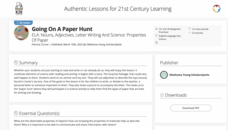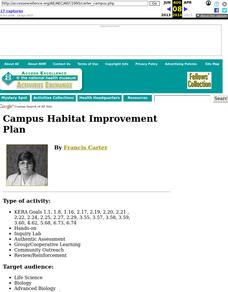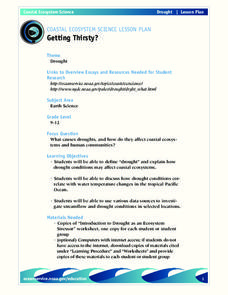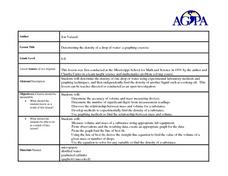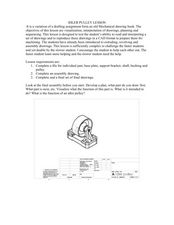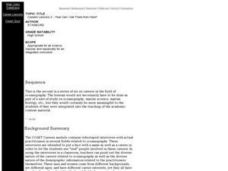University of California
You Are What You Eat: Testing for Organic Compounds in Foods
We have all heard that we are what you eat, but what are we eating? An informative lesson opens with a discussion of the foods pupils have recently eaten. Then, young scientists perform four experiments on seven different foods to...
Kenan Fellows
Ready, Set, Save on Solar Energy Technology!
Does your class have a bright future in the solar energy industry? Science scholars take an in-depth look at what's new in solar technology. After completing research into the solar industry, participants create and market a product in...
Curated OER
Form and Observation
Use a familiar song and adorable baby animal pictures to teach youngsters about genetic variation. Begin by listening to "Twelve Variations on 'Ah vous dirai-je Maman,'" which you will need to find online (there are several versions...
Aquarium of the Pacific
States of Matter: Making Ice Cream
Who knew that learning about the states of matter could taste so sweet? This fun hands-on activity captures the attention of learners as they use what they know about solids, liquids, and gases to create their very own batch of ice cream.
Rainforest Alliance
Knowing the Essential Elements of a Habitat
To gain insight into the many different types of habitats, individuals must first get to know their own. Here, scholars explore their school environment, draw a map, compare and contrast their surroundings to larger ones. They then write...
Columbus City Schools
Asexual and Sexual Reproduction
Can you name a type of reproduction that produces no variation in the offspring? The multimedia lesson covers both sexual and asexual reproduction through videos and discussions. It includes topics such as genetic modification, meiosis,...
Howard Hughes Medical Institute
Niche Partitioning Activity
Dinnertime on the African savanna is a highly choreographed event! Introduce young ecologists to the concept of niche partitioning through a hands-on activity. Pupils research animal behaviors and use data to develop an understanding of...
Curated OER
Mirror Image
Why does practice make perfect? Give your class insight into procedural memory, where we learn to do new things — then continue to improve through repetition. By attempting to draw shapes while looking in a mirror, learners observe their...
University of Minnesota
Neuropathfinding: Kinesthetic Model
Playing follow the leader has never been so interesting! Get the class up and moving while they take on the roles of nervous system components. Through trial and error, they learn the importance of the "pioneer" growth cone that leads...
K20 LEARN
Going on a Paper Hunt: Nouns, Adjectives, Letter Writing and Science - Properties of Paper
A lesson introduces scholars to nouns and adjectives. After listening to a short story and practicing creating adjectives with a card sort, pupils go on a paper hunt to locate different types of paper, complete a chart with adjectives,...
K20 LEARN
Ecosystems, Human Activity, And Interactions, Oh My!: Human/Environment Interaction
Word clouds about ecosystems hook learners into a lesson that explores Yellowstone wildlife. Young scientists create cause-and-effect relationships after examining data and recommend solutions to their observed problems. More data...
Curated OER
National Estuarine Research Reserve System
Students investigate the benefits of estuarine research reserves. In this National Estuarine Research Reserve lesson plan, students learn how to obtain information on the 26 reserve sites, they discuss the importance of the reserve...
Curated OER
The Tides-Ups and Downs
Students investigate tidal patters and the forces that cause the tides. In this tidal lesson plan, students explore and research the tides and complete 43 questions about the causes of the tides, how they are monitored and measured and...
Curated OER
Campus Habitat Improvement Plan
Young scholars work to improve a plot of land. They assess the needs of the environment and formulate a plan. They plant trees and gardens, build bird boxes, construct waterholes. etc.
Curated OER
Getting Thirsty?
Students explore the concept of drought and its significance as a natural hazard. In this drought lesson plan, students complete 13 questions on an "Introduction to Drought as an Ecosystem Stressor" worksheet and discuss the responses as...
Curated OER
Determining the Density of a Drop of Water-A Graphing Exercise
Middle schoolers determine the density of 1 drop of water. In this determining density lesson plan, students determine the mass and volume of a drop of water in the lab using appropriate lab techniques and calculate the density of a drop...
Curated OER
Droplets and Downpours
Students explore how storm water flows through different habitats by sketching the slope of their yard, compare runoff for erosion, and create a sand castle. In this storm water lesson plan, students measure where their yard started and...
Curated OER
Earth Day - Hooray
Students listen to the story, Earth Day - Hooray!, and discuss the story as it is being read. In this Earth Day lesson, students discuss incentives and penalties in regards to taking care of the Earth. This lesson plan also includes...
Curated OER
Unit Plan Template
Learners research the adaptations of desert animals and build their research skills. In this the adaptations of desert animals lesson, students describe major factors that desert animals have on their habitat. Learners explore how to...
Curated OER
Idler Pulley Lesson
Students interpret drawings and reproduce them in a CAD format. In this design lesson students complete an assembly drawing of a pulley system.
Curated OER
Careers Lessons 2 - How Can I Get There from Here?
Learners identify differences between jobs and careers, and identify career areas within the broad field of oceanography. They research, compare and contrast requirements needed to become a practitioner of various oceanographic career...
Curated OER
Counting Animal Populations
Learners learn how to count animal populations by the Mark and Recapture method. In this counting animal populations lesson plan, students begin by predicting amounts of different candies in a jar. Learners then simulate using beans, two...
Curated OER
Diaper Challenge
Young scholars compare the absorbency of a regular diaper and a swim diaper in fresh water and salt water. In this absorbency lesson plan, students mass the diapers and place them in water and determine the change in mass. They do the...
Curated OER
From Milk to Cheese and Seed to Shelf
Young scholars learn about food production by making cheese, seeing how a seed gets to a shelf, and discussing food safety. In this food production lesson plan, students complete 3 days worth of activities and learn about food...
Other popular searches
- Social Skills Lesson Plans
- Map Skills Lesson Plans
- Spanish Lesson Plans
- Short Vowel Lesson Plans
- Common Nouns Lesson Plans
- Graphing Skills Lesson Plans
- Sports Lesson Plans
- Art Lesson Plans
- Fact Opinion Lesson Plans
- Esl Lesson Plans
- Social Studies Lesson Plans
- Coping Skills Lesson Plans











